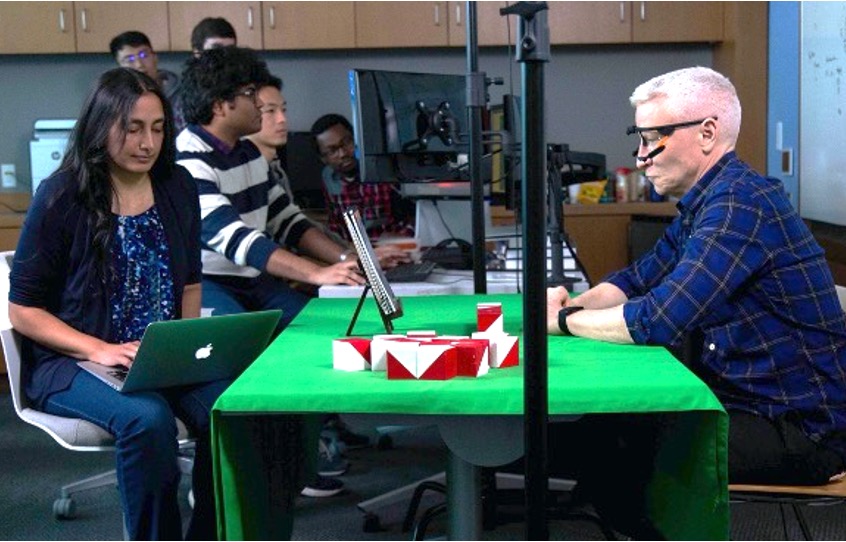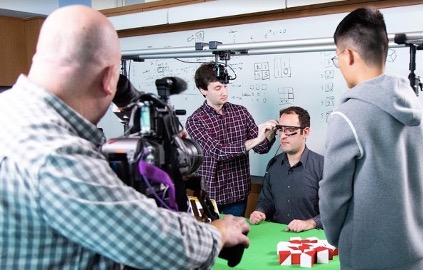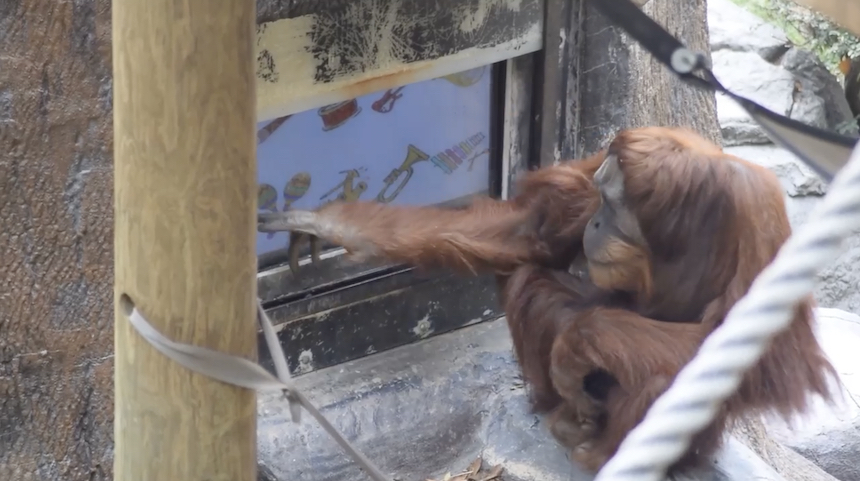Maithilee Kunda
I have moved!
I am now working in the School of Informatics at the University of Edinburgh. Please visit my new website here:
https://homepages.inf.ed.ac.uk/mkunda/

|
Maithilee Kunda is a reader in computational cognitive science in the School of Informatics at the University of Edinburgh. Her work in artificial intelligence (AI), in the area of cognitive systems, looks at how visual thinking contributes to learning and intelligent behavior, with a focus on topics related to autism and neurodiversity. More broadly, her research examines connections between knowledge representations and advanced reasoning abilities in humans, animals, and machines, making use of interdisciplinary methods such as computational modeling and human studies. She directs the Laboratory for Artificial Intelligence and Visual Analogical Systems and is a member of the University of Edinburghs Institute for Language, Cognition, and Computation. Previously, she worked at Vanderbilt University as assistant and then associate professor of computer science, where her research also helped launch Vanderbilts Frist Center for Autism and Innovation. In 2016, she was recognized as a visionary on the MIT Technology Reviews global list of 35 Innovators Under 35 for her work at the intersection of autism, AI, and visual thinking. In 2025, she received the U.S. Presidential Early Career Award for Scientists and Engineers (PECASE). She holds a B.S. in mathematics with computer science from MIT and a Ph.D. in computer science from Georgia Tech. |
AIVAS Lab website for more on our amazing team of students, current projects, complete list of publications, datasets, and open lab positions.
Our work featured on 60 Minutes
Video ▶ “Recruiting for talent on the autism spectrum” on CBS 60 Minutes with Anderson Cooper (Vanderbilt portion begins at 7:40).
Video ▶ A 90-second snippet from our portion of this 60 Minutes piece.
Research behind the demo featured on 60 Minutes, including a more in-depth look at the data from our volunteers Dan Burger and Anderson Cooper.

|

|
|
Our work featured in the New York Times
How Robots Can Assist Students With Disabilities
By Alina Tugend
“New tools use artificial intelligence to assist students with autism and dyslexia and address accessibility for those who are blind or deaf.”
Recent highlights
[oral + 22% acceptance] *Dunn, A., *Qiao, A., *Johnson, M., & Kunda, M. (2021). Measuring more to learn more from the block design test: A literature review. Proceedings of the 43rd Annual Meeting of the Cognitive Science Society. p. 611-617. *Co-first authors. [pdf]
[oral] Michelson, J., Sanyal, D., Ainooson, J., Yang, Y., & Kunda, M. (2021). Social cognition paradigms ex machinas. Proceedings of the AAAI Fall Symposium on Computational Theory of Mind for Human-Machine Teams. [pdf]
[JADD] Rashedi, R., Bonnet, K., Schulte, R., Schlundt, D., Swanson, A., Kinsman, A., Bardett, N., Warren, Z., Juarez, P., Biswas, G., & Kunda, M. (2021). Opportunities and challenges in developing technology-based social skills interventions for adolescents with autism spectrum disorder: A qualitative analysis of parent perspectives. Journal of Autism and Developmental Disorders. [pdf]
Ainooson, J., Michelson, J., Sanyal, D., Palmer, J. H., and Kunda, M. (2020). Strategies for visuospatial reasoning: Experiments in sufficiency and diversity. Proceedings of the Eighth Annual Conference on Advances in Cognitive Systems (ACS). [pdf]
Hua, T., and Kunda, M. (2020). Modeling Gestalt visual reasoning on Raven’s Matrices using generative image inpainting techniques. Proceedings of the Eighth Annual Conference on Advances in Cognitive Systems (ACS). [pdf]
[PNAS] Kunda, M. (2020). AI, visual imagery, and a case study on the challenges posed by human intelligence tests. Proceedings of the National Academy of Sciences, 117 (47), 29390-29397. [pdf]
★ Best Paper Award ★ Yang, Y., McGreggor, K., and Kunda, M. (2020). Not quite any way you slice it: How different analogical constructions affect Raven’s Matrices performance. Eighth Annual Conference on Advances in Cognitive Systems (ACS). Winner of the inaugural ACS Patrick Henry Winston Award for Best Student Paper. [pdf]
Zi, X., Li, S., Rashedi, R., Rushdy, M., Lane, B., Mishra, S., Biswas, G., Swanson, A., Kinsman, A., Bardett, N., Warren, Z., Juarez, P., and Kunda, M. (2020). Science learning and social reasoning in adolescents on the autism spectrum: An educational technology usability study. Proceedings of the 42nd Annual Meeting of the Cognitive Science Society. [pdf]
Other significant works
Kunda, M. (2019). AI and cognitive testing: A new conceptual framework and roadmap. 41st Annual Meeting of the Cognitive Science Society, Montreal, Canada. p. 2065-2070. [pdf]
Kunda, M. (2019). Nonverbal task learning. In Proceedings of the Seventh Annual Conference on Advances in Cognitive Systems, 609-622. [pdf]
[Cortex] Kunda, M. (2018). Visual mental imagery: A view from artificial intelligence. Cortex, 105, 155-172. [pdf]
[Intelligence] Kunda, M., Soulières, I., Rozga, A., & Goel, A. K. (2016). Error patterns on the Raven’s Standard Progressive Matrices Test. Intelligence, 59, 181-198. [pdf]
[ACS Journal] Kunda, M., and Ting, J. (2016). Looking around the mind’s eye: Attention-based access to visual search templates in working memory. Advances in Cognitive Systems, 4, 113–129. [pdf]
[Artificial Intelligence] McGreggor, K., Kunda, M., and Goel, A. K. (2014). Fractals and Ravens. Artificial Intelligence, 215, pp. 1-23. [pdf]
[Cog. Sys. Research] Kunda, M., McGreggor, K., and Goel, A. K. (2013). A computational model for solving problems from the Raven’s Progressive Matrices intelligence test using iconic visual representations. Cognitive Systems Research, 22-23, pp. 47-66. [pdf]
[JADD] Kunda, M., & Goel, A. K. (2011). Thinking in Pictures as a cognitive account of autism. Journal of Autism and Developmental Disorders, 41 (9), 1157-1177. [pdf]
Full list of research papers here.

|
Orangutans! See orangutans using our cognitive enrichment app! Video ▶ Dumadi uses the musical instruments “game”—apparently his favorite part of the app. Video ▶ Madu is surprised (and touched, according to the zookeepers who knew her) to see a video of her late orangutan friend Alan in the “Zoo-Videos-Youtube” part of the app. |
Video ▶ App Inspiration leads Vanderbilt student to code for orangutans
Find Your Impact: Student creates app for orangutans. Vanderbilt Research News. Feb. 22, 2019.
Scheer, B., Renteria, F. C., and Kunda, M. (2019). Technology-based cognitive enrichment for animals in zoos: A case study and lessons learned. In Proceedings of the 41st Annual Meeting of the Cognitive Science Society, p. 2741-2747. [pdf]
In the media
How robots can assist students with disabilities, by Alina Tugend. New York Times. March 29, 2022.
Finding strengths in autism, by Rachel Nuwer. Spectrum News. May 12, 2021.
Film Detective: How an AI-powered game aims to improve outcomes for students with ASD, by Bennett Lunn. Inside IES Research, US Institute of Education Sciences (IES). Nov 3, 2021.
Perspective matters: How diversity of background, expertise, and cognition can lead to good science, by Bennett Lunn. Inside IES Research, US Institute of Education Sciences (IES). Aug 17, 2021.
Leading the Vanguard interview, by Elizabeth Turner. Vanderbilt Kennedy Center Notables. Mar. 5, 2020.
Film Detective helps kids with autism interpret actors’ actions, by Brenda Ellis. Vanderbilt News. Jan. 27, 2020.
Harnessing the human diversity of mind, Vanderbilt team selected as one of top 33 finalists in NSF’s 2026 Idea Machine competition. May 31, 2019.
AAAS explores what artificial intelligence teaches us about ourselves, by Michaela Jarvis. American Association for the Advancement of Science (AAAS). Dec. 5, 2017.
Using AI to understand autism, Top Of Mind podcast with Julie Rose. Nov. 1, 2017.
Visual thinking, autism and artificial intelligence, Assistive Technology Update podcast with Wade Wingler. Oct. 6, 2017.
AI that thinks in pictures, The Women in Tech Show podcast with Edaena Salinas. Nov. 8, 2016.

|
Temple Grandin visits our Imagery-Based AI class! I was honored to help organize Dr. Temple Grandin’s visit to Vanderbilt and arrange this visit to our class. In fact, it was reading her autobiography during graduate school that kick-started my interests in visual thinking; this class exists as a direct result of her writings! Video ▶ Short video highlighting this classroom visit Video ▶ Dr. Grandin’s Chancellor’s Lecture Grandin rejects low expectations, insists workforce critically needs people with autism in VU lecture, Vanderbilt News, Nov. 30, 2018. |
Teaching
Computation and Cognition. Computational approaches to understanding human cognition, including research design and methods for integrating models with theory and observation. Topics include knowledge representation, concept formation, reasoning and search, analogy, mental imagery, and connectionism, as well as multidisciplinary perspectives on mind, brain, behavior, and society. (Previous names: Introduction to Cognitive Science. Taught at Georgia Tech: Summer 2013, Fall 2013, Summer 2015. Taught at Vanderbilt: Spring 2016, Fall 2017.)
Imagery-based Artificial Intelligence. Mathematical and computational techniques for imagery-based artificial intelligence (AI). Topics include imagery-based knowledge representations, imagery-based reasoning and problem solving approaches, and machine learning in imagery-based systems, as well as cognitive science findings related to human visual mental imagery in autism, education, and scientific discovery. (Previous names: Computational Mental Imagery. Previously taught: Fall 2016, Fall 2018.)
Artificial Intelligence. Principles and programming techniques of artificial intelligence. Strategies for searching, representation of knowledge and automatic deduction, learning, and adaptive systems. Survey of applications. (Taught: Fall 2019, Fall 2020, Fall 2021, Spring 2022.)
Advanced Artificial Intelligence. Discussion of state-of-the-art and current research issues in heuristic search, knowledge representation, deduction, and reasoning. Related application areas include: planning systems, qualitative reasoning, cognitive models of human memory, user modeling in ICAI, reasoning with uncertainty, knowledge-based system design, and language comprehension. (Taught: Spring 2020, Spring 2021.)
Introduction to Machine Learning. Fundamentals of machine learning (ML), with a focus on supervised learning and reinforcement learning. Topics include decision trees, neural networks, instance-based learning, boosting, temporal difference learning, and also data privacy, human subjects research protections, and impacts of ML on society. (Catalog name: Projects in AI. Previously taught: Spring 2017, Spring 2018, Spring 2019.)
Resources for learning about AI
People often ask me for recommendations on how to learn about AI. Here are some resources that are good for beginners:
1. Melanie Mitchell’s Artificial Intelligence: A Guide for Thinking Humans
This very recent book gives a non-technical but content-rich overview of the broad field of AI, where it has been and where it is going, and descriptions of major approaches.
2. Neural Networks and Deep Learning by Michael Nielsen
This free, online textbook provides a very concise, effective, and easy-to-read introduction to neural networks, especially (but not only) if you are starting from scratch. Particularly valuable are the interactive exercises presented alongside the reading material, including Python code that you can download and mess around with.
3. Tom Mitchell’s Machine Learning textbook
This book gives an excellent and digestible overview of major approaches and also theoretical angles. (Do not be put off by the 1997 publication date! The fundamentals abide.)
Of course, there is a LOT more to AI than machine learning. (If you are at all surprised by this statement, then you should pay particular attention to this next section!) For an insightful window into other areas of AI, I recommend the following:
4. Knowledge-Based AI: Cognitive Systems
This freely-available online course is taught by Ashok Goel (my PhD advisor) and David Joyner (one of my PhD “siblings”). The introduction alone gives an excellent birds-eye view of the big conundrums that drive AI research, and how different areas of AI attempt to frame and solve these conundrums in different ways. (Trivia: This was also the course in which one of the TAs was the infamous Jill Watson….)
5. Mind Design II, edited by John Haugeland
Reading this book was one of the most influential intellectual journeys I ever took. Starting with Turing’s classic paper on “Computing Machinery and Intelligence,” going through key ideas from thinkers like Newell & Simon, Dennett, Rumelhart, and Brooks. (You can also find many of the individual papers from this collection online, in their original published form.)
Contact
Maithilee Kunda
mkunda [at] vanderbilt [dot] edu
PMB 351679
2301 Vanderbilt Place
Nashville, TN 37235-1679, USA
Phone: 615-875-8469
Fax: 615-343-5459